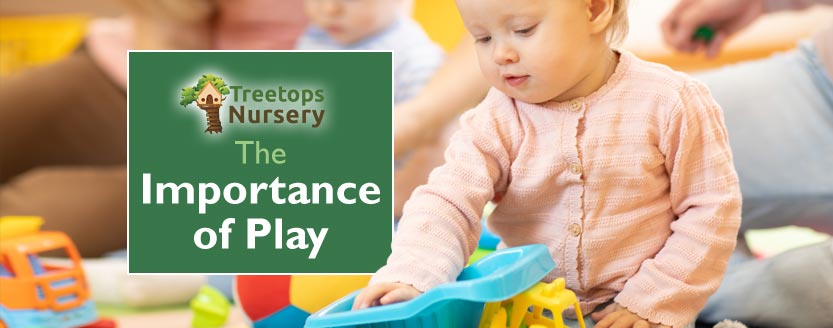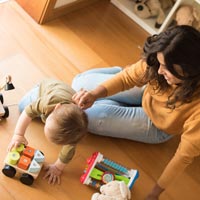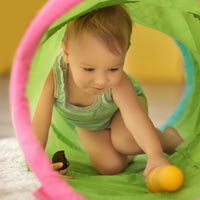
Play is incredibly important — perhaps more so than many people realise — especially during a child’s formative years. That’s why under-fives, in particular, must be given ample time and encouragement to play.  In short, allowing a young child the tools, time and guidance to play regularly will help them with many elements of their learning and development — and that’s critical. Indeed, that’s why good nurseries, pre-schools and childcare settings encourage children to learn in large part through play.
In short, allowing a young child the tools, time and guidance to play regularly will help them with many elements of their learning and development — and that’s critical. Indeed, that’s why good nurseries, pre-schools and childcare settings encourage children to learn in large part through play.
“Play is essential to development because it contributes to the cognitive, physical, social, and emotional well-being of children” (Paediatrics Journal)
The Benefits of Play
Regular play, starting from when children are babies, helps children in a myriad of ways as they grow to become first toddlers, then preschoolers, and beyond. The many benefits of play include:
 Firstly, it’s fun for them and is an essential part of a happy childhood;
Firstly, it’s fun for them and is an essential part of a happy childhood;- Play helps babies, toddlers and children to learn about the world around them, by interacting with all the things in it (under adult supervision, of course);
- Play helps to educate children about themselves, their abilities, strengths, weaknesses, skills and preferences;
- It teaches them about all the things they interact with too; from size and weight to texture and a variety of other properties;
- It improves cognitive function and aids healthy brain development;
- Play helps children to improve their dexterity through fine motor skills like holding, rotating and moving small objects in precise ways to suit their intended outcome, all at the same time as honing their hand-eye coordination;
- As they grow older, play also helps children to improve and develop their gross motor skills, enabling them to confidently and precisely control their limbs to lift, throw, extend, pull, push, move and eventually walk, run, jump and so on;
- Play also helps children to learn from their mistakes just as much as from their achievements. That’s an important lesson that we’ve all gone through even into adulthood;
- Doing so also helps children to get a more balanced view of the potential risks and rewards associated with carefully-considered actions and the comprehension of cause and effect;
- Regular physical play helps children to remain active and more fit. After all, lying inactive or sat in front of a TV or other electronic screen has the opposite effect;
 Play also keeps children mentally fit as it stimulates their senses, brains and sense of adventure;
Play also keeps children mentally fit as it stimulates their senses, brains and sense of adventure;- Regular and varied play also helps children to identify their own talents and interests;
- Play stimulates children’s imaginations, leading to greater creativity and new ways of thinking;
- Improved problem-solving and critical thinking is a natural, positive outcome of this;
- Children also learn to interact with others through play, thereby improving social skills including communication, speech, negotiation, teamwork, leadership, cooperation, role-play and so on;
- Children develop closer bonds through play, including with other children as well as any supervising adults. Through play, friendships naturally form;
- With all of these benefits, children naturally become more self-confident individuals, becoming more able to tackle things independently i.e. with less need for adult direction;
- Their emotional development also benefits;
- Play is also a great way to relieve any stress, even diverting attention away from pain;
- Playing with children also helps the supervising adult to immerse themselves into their child’s world, becoming more able to see the world from the child’s perspective.
 All in all, play fosters both physical development and mental development in children. Doing so sets them up with improved physical and cognitive abilities as well as incredibly important life skills. Combined, this also sets under-fives up beautifully for school-readiness when they leave pre-school.
All in all, play fosters both physical development and mental development in children. Doing so sets them up with improved physical and cognitive abilities as well as incredibly important life skills. Combined, this also sets under-fives up beautifully for school-readiness when they leave pre-school.
We may follow this post up, at a future date, with some suggested play activities and guidance.
One of the Best Nurseries in Willesden, Harlesden & Kensal Green
 At Treetops Nursery in Willesden, our childcare professionals create carefully-planned opportunities for play using a huge array of stimulating equipment, facilities and programmes. That’s all part of the learning and development plan that’s customised for each individual baby or child at the nursery. It’s widely accepted that children, particularly the very young, learn best through play. This approach, together with the individual attention of our exceptional childcare professionals, is why little ones absolutely thrive at Treetops. It’s also why Treetops is so popular and in-demand as a nursery and pre-school in the NW10 area.
At Treetops Nursery in Willesden, our childcare professionals create carefully-planned opportunities for play using a huge array of stimulating equipment, facilities and programmes. That’s all part of the learning and development plan that’s customised for each individual baby or child at the nursery. It’s widely accepted that children, particularly the very young, learn best through play. This approach, together with the individual attention of our exceptional childcare professionals, is why little ones absolutely thrive at Treetops. It’s also why Treetops is so popular and in-demand as a nursery and pre-school in the NW10 area.
If you are looking for one of the very best nurseries in Willesden, Willesden Green or close to Harlesden or Kensal Green, please make contact while we still have some childcare spaces available. Please choose an option:
